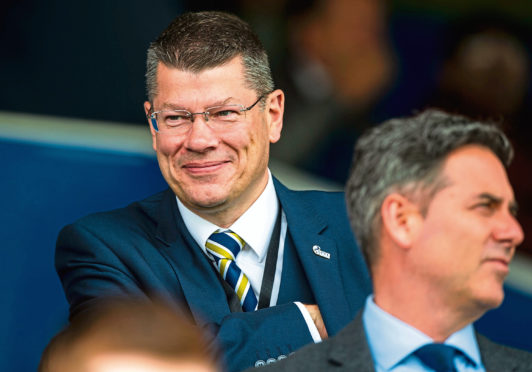
It’s been the norm in Scottish football in recent months for there to be some sort of spat between the SPFL hierarchy and some of their member clubs.
For journalists, headline writers, radio phone-ins and football debate shows, there’s been plenty to talk about and argue over.
Due to the vote to end the season early, Hearts, Partick Thistle and Stranraer were relegated.
They felt that was grossly unfair, and went against everything the game stood for.
I could absolutely see their point.
They took it all the way to court, and last Monday, the arbitration panel delivered their verdict.
They deemed that Neil Doncaster and the SPFL executive committee had acted appropriately in their dealings with the situation.
Doncaster immediately released a statement, saying that he felt vindicated.
Craig Levein, sacked by Hearts last October from his position as director of football, felt that the SPFL chief executive was gloating.
He believed Doncaster should have been more respectful to the unfortunate situation that the Jambos, and the other relegated clubs, found themselves in.
Craig is entitled to his opinion.
I watched Doncaster give an interview in the Sky studios, and I didn’t think that he came across in an untoward manner.
He basically said that he was pleased that the SPFL were satisfied with the decision.
Considering that there have been accusations and innuendo against Doncaster and some of his colleagues – not to mention several letters from various clubs, including Rangers – it is understandable there would be a feeling of satisfaction and relief.
The spotlight had been well and truly on the SPFL hierarchy for nearly five months, and no chief executive should be happy when that is the case.
I wrote in this column many times that I didn’t agree with some of the things that had gone on within the SPFL, and I stand by that.
Despite winning their case, it is clear improvements in their governance still need to be made.
I hope that some of the things that have been highlighted are addressed and corrected.
Things can’t be swept under the carpet.
That’s not to say it all needs to be done in public. It can be just as effective doing things quietly in the background to get the desired result.
Moving forward, I think we’d all like to see a line drawn under all of this, and now concentrate on the football.
We have all the makings of some exciting stuff in the Premiership this season, and we need to embrace that.
We also have a cracker of a Championship in prospect.
And as if we didn’t need any more talking points and controversy, the SPFL fixtures computer has thrown Hearts and Dundee together on the opening weekend of their season in October.
That raised a few eyebrows and has brought how the fixture list is actually compiled into the spotlight.
That was the case a couple of weeks ago when the first Old Firm game of the season was scheduled for the 11th round of the campaign, with the suspicion that was to give every chance of fans being present inside Celtic Park.
I’ve always been of the mind that a computer can only come up with supposed solutions, based on the information fed into it by a human being.
Certainly, in this instance, a human should be able to overrule the computer.
It’s different, I think, when it comes to relying on technology on the park.
For example, when Sheffield United were denied a goal at Aston Villa in the first fixture post-lockdown, that was down to a failure of an electronic system.
Bournemouth now feel that the point Villa gained meant they avoided relegation, and Eddie Howe’s men went down.
I sympathise with them, but I don’t think the legal route to tackle this is the way to go.
They have been relegated and that should stand.
Their focus should now be on getting straight back up to the top flight.
That has to be the case with Hearts, and Partick Thistle and Stranraer should also be concentrating on promotion.
It’s good we will now be judging things from what happens on the park, and not what happens in the courtrooms.

Enjoy the convenience of having The Sunday Post delivered as a digital ePaper straight to your smartphone, tablet or computer.
Subscribe for only £5.49 a month and enjoy all the benefits of the printed paper as a digital replica.
Subscribe